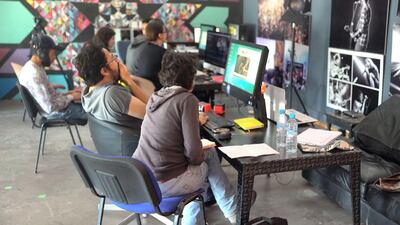There’s no shortage of streaming sites seeking to emulate the success of global giants like YouTube and Netflix. Of them, ALTV is the Middle East’s most promising contender, but it is more than just a streaming site.
Currently operating in Egypt, Jordan, Morocco and Lebanon, more than 50 per cent of ALTV’s content is produced by its members. It also offers film enthusiasts a platform to learn the trade, with video training available for everyone from those setting out to make their debut video to those seeking a route into full-time work.
ALTV chief David McCourt – who’s also the chairman and CEO of ALTV’s parent company, the private investment firm, Granahan McCourt Capital – has high hopes for the regional service which is about to launch in Dubai.
“I’ve been in the TV industry for a quarter of a century, and it must be the only industry in the world where America has a trade surplus with every single country in the world,” says McCourt, keen to change this imbalance.
To this end, the entrepreneur started the TV station Discovery TV in the Caribbean in 1985, where he trained local staff to make their own shows rather than import programmes from abroad. The station was founded in Grenada with 30 foreign employees and when McCourt sold it to the government some years later, it had 30 Grenadian employees.
McCourt's not afraid to use his celebrity connections to get the job done either – several stars appeared in the 2003 Showtime documentary series What's Going On?, and producer McCourt carried his local training initiative through here too: "I did a documentary with Angelina Jolie about refugees in Tanzania and sent cameras and trained local people how to use them," he says.
“It was the same thing with Michael Douglas when I made a documentary about child soldiers in Sierra Leone. When he went on Oprah Winfrey, the clip they showed was actually shot by a young kid we’d trained who’d never previously shot with a camera before.”
Now, says McCourt, he wants to use the same model for the world of digital content. ALTV has already undertaken training and let its graduates out to start shooting in Egypt, Morocco and Jordan. Once its Dubai operation is up and running, McCourt says the ALTV team will host a series of meetings and workshops from which they hope to develop a crop of UAE-based content creators.
The site will be launched complete with localised versions of the most popular shows from the Middle Eastern markets, where it is already in operation.
The content will include Streets Points of View, a six-times daily show that, as the name implies, seeks opinions from the streets of Cairo.
McCourt says the service may also introduce a reading show that would celebrate the UAE's Year of Reading (2016). Other popular shows already on the site include the Jordanian hit comedy Al Hob El Hob, which starred Jordanian comedian Rajae Qawas and pulled in 1.5 million viewers per episode during Ramadan.
Negotiations are also under way to bring exclusive football content from around the world to the platform.
In addition to the streaming site, plans are afoot for an upgraded app that will connect interested filmmakers with training modules and allow them to collaborate all over the world.
“With digital now we can have a situation where three guys in Dublin, Cairo and Abu Dhabi can all work on the same show, they can have the same music, the same green screen background and go through the whole process on an app, right up to getting paid direct to their phone when Coke advertises on the show,” McCourt says.
It is basically the YouTube model of income generation – a free stream with in-stream ads, which raises the question, how can a newcomer to the market compete with an established behemoth like YouTube, particularly in the Middle East where YouTube viewership is the highest in the world.
“YouTube is collection of all content, with no discrimination on value or quality,” McCourt adds.
“We’re trying to take that YouTube cost model of cheap production, but offer a BBC or MBC quality, while keeping it very local. That’s our unique definitions – cheap, quality and local.”
With the ALTV Facebook page having attracted two million followers since it launched less than a year ago, viewer numbers exceeding expectations (Streets Points of View has had more than 50 million to date) and expansions already in the pipeline in South America and sub-Saharan Africa, McCourt is confident.

